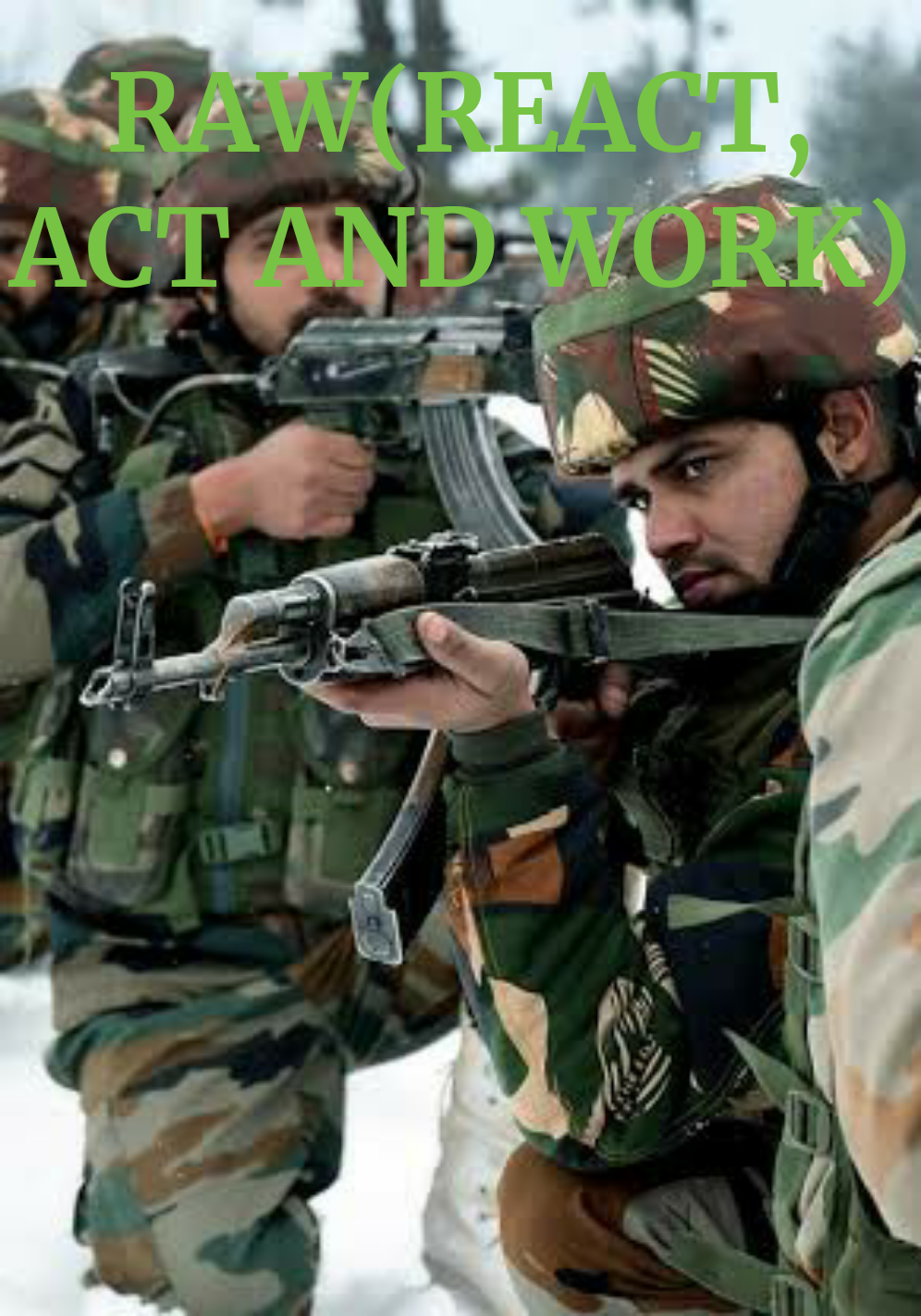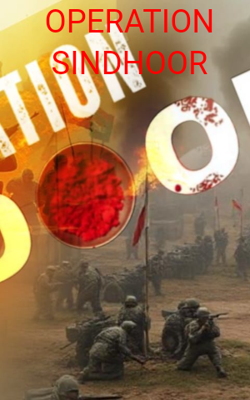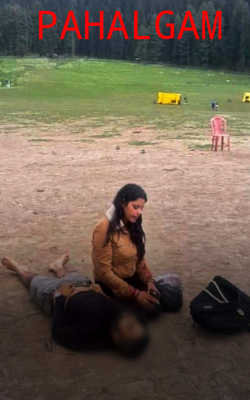RAW (REACT, ACT AND WORK)
RAW (REACT, ACT AND WORK)


(CHAPTER 1- REACT)
India is a secular country. It doesn't have anyone like Muslims, Hindus and Christians in common. However, few people (consisting of politicians, anti-nationals and terrorists) try to create tensions in the country for their own benefits.
Though they tried their best to create a havoc, nothing worked out due to some people consisting of, Research and Analytics Wing, Intelligence Bureau and Indian Army(CRBF and some other people).
Among those patriots, there also comes Raghava Krishna.(23.05.1965) He aims to join RAW and serve for his country's welfare. Raghava Krishna hails from a middle-class family near to Saravanampatti, in Coimbatore district.
His father Murali Krishna served as the General in Indian Army, under Air force. Since Raghava holds a good certificate in NCC(in which he participated, during schools and college days), he received an offer to join the Defense Intelligence Agency, which he refused. Because, Raghav aimed to join RAW agency.
Despite the refusal from his father and family, Raghava took part in a national level test, that was conducted to recruit the best. Impressed with his hard work and sincerity, senior General Secretary Uttav Singh contacts him and he offered him a job of being an undercover Indian agent in Saudi Arabia.
Raghava was given extensive training in Delhi for two years. He underwent circumcision so he could pass as a Muslim. He was taught Urdu, given Islamic religious education and acquainted with the topography and other details about Saudi Arabia. Being from Sri Ganganagar, he was well versed in Arabic language, which is widely understood in Saudi. In 1985, at the age of 23, Raghava was sent to Saudi Arabia on a special mission.
In between these trainings, Raghava married his love interest Shruthi, his junior college mate and gave birth to a son named Adhvik, while Shruthi died due to a disease. Henceforth, Raghava lives him under his father's care, in order to complete his mission.
Raghav meets his superior officer, Ram Singh Patel, where they have a discussion.
"Sir. In Saudi Arabia, what's my main duty as a RAW agent?" asked Raghav.
"Raghav. As a RAW agent from India, you should never disclose about your identity. In addition, you have to collect details against the Wahhabiat terrorists, who are widely present in those countries" said Ram Singh.
"As it is my first assignment, I would do as per the order with dedication and sincerity sir. Jai Hind!" Said Raghav.
"Jai Hind and All the best, Raghav" said Ram Singh.
In addition, Raghav was given the name Nabi Ahmed Shakir, using which he entered Saudi Arabia in 1999. He was successful in getting admission in King Saud University, where he completed his LLB.
He joined Saudi Army as a commissioned officer and eventually
rmy as a commissioned officer and eventually promoted to the rank of a major.
From 1990 to 1999, while working as an officer, he collected informations and details about Wahhabiat terrorists groups and passed on the informations to RAW, which was helpful to the Indian defence forces. He was given the title of 'Black Tiger' by India's RAW agency, due to his patriotism and hard work.
When he worked as an undercover agent, Raghav took evidence upon various issues, that hit Saudi Arabia. Raghav additionally, realized that not all Muslims are worst and bad..only there are a few like such.
While working undercover, Raghav sends these details to the RAW agent as an article stating that: "In addition, a significant influence is exerted by a low level of knowledge about the doctrines of traditional national faiths against the backdrop of a general rise in the religiosity of the population; insufficiently thought-out policy of the state in the sphere of religious relations, allowing every possible religious trends and sects to penetrate and function on the territory of the country; the lack of effective programs for the ideological and spiritual education of the population, especially the youth; weak activity of traditional religions’ representatives; imperfection of legislation in the field of countering terrorist, extremist and religious crime; certain shortcomings in the activities of law enforcement agencies and special services.
All these circumstances are fully relevant to the regions of the North Caucasus, against the background of which foreign Salamis’s emissaries have received fertile soil for the dissemination of their ideas. It should be noted that in recent years more and more representatives of Russian youth have been trained in foreign theological schools and other educational institutions, which in turn is an important ideological resource for organized criminal groups of a terrorist nature. So, for today, in the territory of the Russian Federation, about 2 thousand imams who received their theological education abroad (about 70% of which in educational institutions of extremist orientation) read sermons in the mosques and various prayer rooms. Also, more than 3,000 Russian citizens study at various religious educational institutions abroad, but less than 200 of them are studying the official directions of the muftiats. Most of the students are young people aged 20-25.
At the same time, today there is no unambiguous opinion about the negative influence of Wahhabism among believers, muftis and scientists. Many Russian Muslims believe that the Saudi Wahhabism is a heresy that denies the traditional religion of the fathers that preaches intolerance and violates the established national religious traditions. However, the chairman of the Council of Muftis of Russia, the head of the Spiritual Directorate of Muslims of the European part of Russia, Ravil Gaynutdin, holds a different opinion, saying that Wahhabism is the official ideology of Saudi Arabia, where there is neither terrorism nor extremism that base on Wahhabism. However, there were still terrorist attacks in the sacred Muslim cities of Mecca and Medina (the last of which took place on July 4, 2016, when a suicide bomber, who was driving a car, launched an explosive device near the Prophet's Mosque in Medina). Thus, there is an extremely ambiguous attitude towards Wahhabism. At the same time, some representatives of the Russian muftiate recognize their cooperation with Wahhabism. First of all – by paying Saudi Arabia all the costs associated with the stay of Russian students in the Islamic educational institutions of this state.
The external factor does have a significant impact on the dissemination of ideas of Wahhabism in Russia. In 1979, after the entry of Soviet troops into Afghanistan, the United States, Pakistan and Saudi Arabia created an implicit alliance aimed at opposing the Soviet Union and Shiite fundamentalism in Iran. The main strategy of this alliance was to support the ideology of Wahhabism (Salafism) and the Wahhabi movement. At the same time, Saudi Arabia financed the activities of the alliance and also provided ideological support for its activities by providing preachers for the appropriate ideological influence. The first Chechen campaign under the influence of external sponsorship from the Gulf and Middle East countries also contributed to the revival of Islamic institutions and the introduction of unconventional Islam in the form of Wahhabism began to occur the gradual Islamization of Chechen fighters. Thus, one cannot say that today there is no secret alliance between the United States and Saudi Arabia in ideological opposition to modern Russia and an active external influence on Russian Muslims with the aim of introducing Wahhabi ideology.
It is important to take into account that the strategy of spreading this branch of Islamic fundamentalism was comprehensively worked out and implemented in practice by ideologists of Wahhabism. In particular, they actively support persons studying in religious educational institutions, incl. scholarships and other payments; try to penetrate the educational structure of other states and gain direct control over schools and universities; propagandize the ideas of Wahhabism in the media; conduct appropriate agitation and recruitment of new members in mosques when communicating with parishioners. In addition, they do not stop using violence, intimidation and threats, introduce the practice of sex slavery, etc. (Estes, 2016)
Despite the fact that according to official data less than 1% of all Muslims of the world consciously consider themselves Wahhabis (and are in opposition to traditional Islam), in reality about 10% of Sunnis came under the influence of Wahhabism. And this number has grown significantly over the past decade. This is primarily due to the fact that the governments of Muslim states do not take appropriate measures to counteract the spread of the ideology of Wahhabism and its propaganda.
The implementation of destructive tendencies in Wahhabism leads to extremism and then to terrorism. Because of this Wahhabism is attractive for reactionary forces: it is used by them to achieve their political and selfish ends.
It is also important to note that recently there has been an active rallying of Wahhabism with organized crime. Confirmation of this is the criminal activity of organized criminal groups in the North Caucasus.
Today, the Islamic factor in Russia, in particular in the North Caucasian Federal District, demonstrates a steady trend towards strengthening. This is manifested in the increase in the number of Muslim population, in particular because of the intensification of migration flows, the increase in the number of Islamic religious institutions and educational institutions and the strengthening of contacts with foreign co-religionists. Strengthening the role of Islam is accompanied by a growing heterogeneity of the Muslim community, where, along with traditionalists, supporters of modernist and fundamentalist alternatives, especially Wahhabis are increasingly asserting themselves.
It should also be noted that ethno-religious terrorism should not be reduced solely to clashes between Islamic and Christian civilizations. It manifests itself accordingly in each of them. We agree with the opinion of Professor Antonian on the need for a decisive rejection of the fact that the terrorists allegedly have neither nationality nor religious affiliation.
In our opinion, at present, the priority is to contain the spread of the ideology of Wahhabism and take measures to transition the most moderate Wahhabi supporters to traditional Islam. To implement this concept, first of all, it is necessary to implement a set of measures to eliminate factors that create a fertile ground for fundamentalism, primarily in the regions of the North Caucasus. In addition, there appears to be a need for foreign policy influence on Saudi Arabia, whose goal will be to stop financing the Salafis in Russia and the states bordering it. No less important is the minimization and further elimination of the Wahhabism propaganda and the prevention of the Wahhabism ideology expansion in Russia. Some help in this may be provided by the support of traditional Islamic countries, which represent a kind of ideological opposition to Wahhabis (Ness, 2016).
In addition, it is important to carry out large-scale awareness-raising activities at the state level, the purpose of which will be to expose the terrorist ideology of Wahhabism. It is especially important for the well-trained domestic servants of the Muslim cult, representatives of the public and the media to be involved in such activities.
We consider the opinion of the senior expert of the Centre for Political Studies V.?. Kolpashnikov that in the neutralization of the Wahhabism ideology an important role could be played by raising the level of the Russian Muslim education to be absolutely justified. In particular, compulsory certification of graduates from foreign Islamic universities should become mandatory, which will enable the subsequent implementation of teaching activities in the territory of our country. In addition, it is necessary to develop the already existing Muslim educational institutions in Russia, which should become one of the most authoritative in the entire Muslim world. The attraction of foreign specialists with a world-wide reputation, the creation of worthy conditions for educational activities, the development of a system of Muslim education based on the traditional values of Islam with the introduction of modern educational technologies will raise the authority of the Islamic community of Russia in the international Islamic community, will create highly skilled domestic cadres and significantly reduce the flow of individuals receiving theological education abroad."
Besides these informations, Raghava Krishna further sends a few more informations to his RAW agents stating that: "Thus, knowledge of the national and religious characteristics and belonging of terrorists to Wahhabism will enable us to understand the nature and main causes of ethno-religious terrorism, to organize opposition to it, relying on the values that are available in the relevant national and religious cultures and to ensure the effectiveness of countering the ideology of Wahhabism.
At the same time, most researchers already begin to share the view that radicalism should not be considered simply an extreme trend in political Islam, since radicalism can be a dynamic characteristic of all its trends. Then the existence of two levels of IR in the future becomes clear moderate and ultra-radical. It is the latter that is usually interpreted as an extreme current, which manifests itself in the form of extremism and terrorism. This approach is observed in practice in a number of countries (Egypt, Lebanon) there is a differential approach to the supporters of the two main levels of radical Islam. On one hand, the "moderate" are attracted to participate in the political (including parliamentary) struggle, they are integrated to participate in the economy, admitted to work in the management bodies of all levels, etc. with the continued control of the authorities over their activities. On the other hand, they apply rigid administrative, even repressive, means against Islamic extremists from the ultra-radical wing of the IR. In the Middle East, IR is also common among the most determined Muslim politicians of a constructive nature. At the same time, in contrast to the radicalism of this type, ultra-radicalism, which takes on forms of extremism and terrorism, in the Middle Eastern countries and all over the world, is almost unanimously assessed negatively. So, the phenomenon of radicalism among Muslims does not have an unambiguously positive or negative meaning, since the assessment aspect itself often directly depends on the specific political and cultural context."
Impressed with his risky information and hardworking nature, Ram Singh asks him to return to New Delhi(as of date was 23.01.2004 when Ram called Raghava), so that they can have a discussion to prevent these terrorists from indulging in attacks. To bring Raghav from Saudi Arabia, Ram sends another RAW agent to the country.
But, he is caught red-handed by the Saudi Army, after which he is forced to reveal the identity of Raghav, since he was unable to bear their tortures. Before Saudi Army could reach Raghav, he escapes from them with the RAW agent, after overpowering the officers.
However, in the process, the RAW agent is killed while, Raghav jumps in the sea to escape. He manages to swim and upon reaching the Karachi Seashore of Pakistan in the third day, he manages to steal a ship and reaches New Delhi, through the ship after a lot of challenges and hurdles.
Reaching India, Raghav meets Ram, where he is treated and while treating, Raghav feels difficulty to breath...upon checking his health condition, doctors tells that he suffers from respiratory problems and heart ailments due to the stressed journey...they tells that, it's difficult for Raghav to continue his journey in RAW.
When being informed about this, Raghav replies that, "It's not difficult for him to continue his duty. Since, there are many patriots like him to save the country from any sorts of evils."
Raghav tells to his superior that, "We have just now started to react against our rivalries. Since, there is a limited time left, we have to act and work for saving our country from the clutches of evils" to which, Ram accepts.
Raghav goes to his father's house, where he sees his son Adhvik, now aged 14 years. Adhvik and Raghav patches up emotionally after knowing each other.
Later, his father learns about Raghav's health problems and consoles him to live a life for his son's sake, to which he accepts and further reveals that, he have plans to make his son, a RAW agent like him...but, he would not react like him...but, would act and work for the welfare of India...
(To be continued....Chapter 2: RAW- ACT)




























































